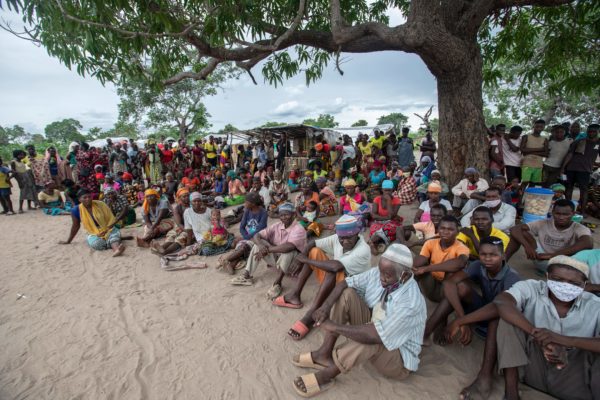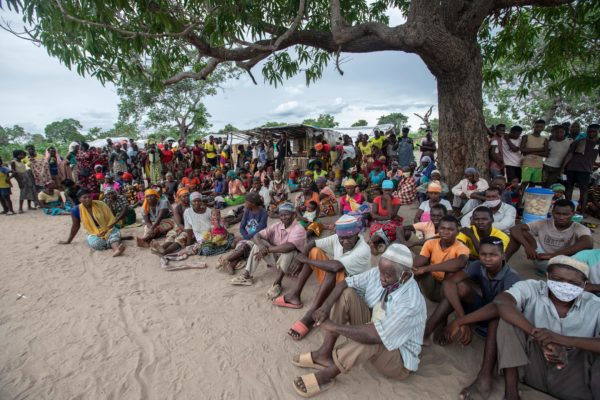Civilians Deaths Continue In Mozambique War, Report Shows Pattern of White Mercenaries Shooting ‘Indiscriminately’ Into Crowds
Mozambique’s war against an Islamic insurgency has been hell on civilians in the African nation’s Cabo Delgado province.
Ahl al-Sunnah wa al Jammaah, Mozambique’s version of ISIS, has targeted and killed hundreds of civilian victims during the three-plus years of fighting. Atrocities have flowed endlessly in a humanitarian crisis underscored by beheadings, vicious machete attacks, executions, desecrated corpses, burned out towns and villages, teen abductions, forced marriages and young women being raped.

And according to a recent Amnesty International report, a group of white South African rebels has intensified violence in the province.
Mozambique government officials hired the mercenaries from Dyck Advisory Group, a private military company, to help with the country’s war effort in the majority-Muslim province. But the private militia has taken free rein and killed civilians “indiscriminately” since entering the fray in Mozambique.
“The people of Cabo Delgado are caught between the Mozambican security forces, the private militia fighting alongside the government and the armed opposition group locally known as ‘Al-Shabaab’ — none of which respect their right to life, or the rules of war,” said Deprose Muchena, a regional Amnesty International official. “All three have committed war crimes, causing the deaths of hundreds of civilians. The international community has failed to address this crisis as it has escalated into full-blown armed conflict over the last three years.”
The war started in 2017, when insurgents occupied the port town of Mocimboa da Praia, according to BBC. Since then, at least 2,600 people have been killed, and nearly half of them are civilian casualties.
Fighting in Mozambique intensified in March 2020 when “Al-Shabaab” carried out a major attack in Mocimboa da Praia, a port town in the Cabo Delgado province.
The Armed Conflict Location and Event Data Project estimates that over 1,300 civilians have been killed during the conflict.
According to Amnesty International, more than 500,000 people have been forced to flee their homes and seek refuge outside the province.
Amnesty International released its report on March 2, outlining several serious violations of international humanitarian law. The human rights organization called for insurgents, mercenaries and Mozambique military to stop targeting civilians. Amnesty International also called for Mozambique government officials to investigate the war crimes they discovered.
“The testimony we have gathered reveals a pattern of repeated, reckless targeting by Dyck Advisory Group,” Muchena proclaimed. “By firing indiscriminately into crowds, attacking civilian infrastructure, and failing to distinguish between military and civilian targets, they have clearly violated international humanitarian law. They must now be held accountable for their actions.”
Mozambique government officials hired the Dyck Advisory Group after Islamist forces outmaneuvered counterinsurgency troops in a series of battles. In several of the fights, Mozambique soldiers stripped off their uniforms and fled the attacks, Vice reported.
Amnesty International investigators interviewed 53 people who witnessed Dyck’s aerial assaults and said the white mercenaries fired machine guns and dropped hand grenades from helicopters. The operatives aimed “indiscriminately into crowds of people, as well as repeatedly fired at civilian infrastructure, including hospitals, schools, and homes,” according to eyewitness reports.
One witness described a June 2020 encounter where Dyck forces engaged on a crowd of terrorists that included civilians.
“Two helicopters came, one shooting and dropping bombs,” the witness said. “One group [of civilians] that was running raised their hands and they were not shot. But another group that was with the bandits did not raise their hands and they were shot. Many people died there.”
Another woman who was trapped inside her home for six days watched as Dyck opened fire on a hospital near her home.
“The helicopters shot against everything and everyone,” the woman said. “For them it was no longer possible to know who was who. The majority of terrorists were in the hospital, thinking the helicopters could not attack. But one helicopter realized this, so they decided to bombard the hospital, that’s how the hospital was completely destroyed.”
Brian Castner, a senior crisis advisor for Amnesty International, told Vice that Dyck may be in violation of violating South African law by fighting in Cabo Delgado. He said the group and Mozambique government officials are both responsible for any of Dyck’s war crimes or illegal acts.
“There is a problematic history of white South Africans fighting as mercenaries across the continent. Lionel Dyck, the founder of Dyck Advisory Group, is himself a former commander in the Rhodesian army,” Castner said. “If [Dyck Advisory Group] can’t fulfill its contractual obligations without killing civilians and targeting hospitals, then it has a duty to stop operating in Mozambique.”
To document Ahl al-Sunnah wa al Jammaah’s alleged war crimes, Amnesty International spoke to 79 displaced refugees. international analysts, journalists, humanitarian aide workers and local human rights marshals. They also reviewed satellite images, photographs, medical information, ballistics reports and social media postings.
The group questioned 16 former residents of Quissanga, a town the insurgents attacked in March 2020.
“They take both boys and girls. … Some, they take them to behead. Some, they make the girls become ‘wives’ and do work in the base. The boys become soldiers,” one of the men who witnessed the attacks told the investigators.
Another woman who was shot during an attack in the Nguida village told Amnesty International that Ahl al-Sunnah wa al Jammaah fighters ordered everyone off a bus for execution in July 2020.
The woman said they killed her husband, then shot her and left her to bleed to death. She was seven months pregnant. Miraculously, she survived and gave birth two months later.

